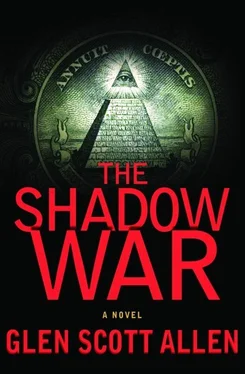Glen Allen - The shadow war
Здесь есть возможность читать онлайн «Glen Allen - The shadow war» весь текст электронной книги совершенно бесплатно (целиком полную версию без сокращений). В некоторых случаях можно слушать аудио, скачать через торрент в формате fb2 и присутствует краткое содержание. Жанр: Триллер, на английском языке. Описание произведения, (предисловие) а так же отзывы посетителей доступны на портале библиотеки ЛибКат.
- Название:The shadow war
- Автор:
- Жанр:
- Год:неизвестен
- ISBN:нет данных
- Рейтинг книги:5 / 5. Голосов: 1
-
Избранное:Добавить в избранное
- Отзывы:
-
Ваша оценка:
- 100
- 1
- 2
- 3
- 4
- 5
The shadow war: краткое содержание, описание и аннотация
Предлагаем к чтению аннотацию, описание, краткое содержание или предисловие (зависит от того, что написал сам автор книги «The shadow war»). Если вы не нашли необходимую информацию о книге — напишите в комментариях, мы постараемся отыскать её.
The shadow war — читать онлайн бесплатно полную книгу (весь текст) целиком
Ниже представлен текст книги, разбитый по страницам. Система сохранения места последней прочитанной страницы, позволяет с удобством читать онлайн бесплатно книгу «The shadow war», без необходимости каждый раз заново искать на чём Вы остановились. Поставьте закладку, и сможете в любой момент перейти на страницу, на которой закончили чтение.
Интервал:
Закладка:
Natalya thought back. There hadn't been any institutional letterhead on Fletcher's note, nor any bulk mail stamp on the envelope. She'd heard of the American Heritage Foundation; she knew obtaining any sort of relationship with the Foundation was considered a real coup by the people she'd studied with at Moscow State Institute. She also noticed that this Benjamin had said he "was" there.
"You're not in Massachusetts now, Mr. Wainwright?"
There was a pause. "No," he said. "I'm here. In D.C." Another pause. "I was wondering… I was hoping I might see you sometime today, Miss Orlova, and speak to you in person about Dr. Fletcher's research."
"That would be impossible, Mr. Wainwright. I am very busy. We have a reception for the Bolshoi Ballet company tonight, and I have not a minute to spare…"
"It's about a file on his computer, to be exact. A file named ' Stzenariy 55. ' Or, perhaps if you don't recognize that, you would know the name inside the file. Borba s tenyu?"
Natalya lowered the phone. Her instinct was to put it and this Wainwright as far away from her as possible.
But it was countered by an even more powerful instinct: the same one that drove her to sit in on Yuri's "interviews"; the same one that had kept her digging for years into her family's dark secrets. And that instinct wasn't about to send Mr. Wainwright away, regardless of the shivers she felt down her spine.
"Ms. Orlova?" Benjamin asked. "Perhaps I'm not pronouncing it correctly. I'm afraid I don't know Russian, and-"
"Mr. Wainwright," she stopped him. She looked about her. Everyone was focused on their tasks for the reception, but still, to have him come today would simply be impossible. If she took time away from the preparations it would be noticed, and she didn't want to attract any undue attention. But she also knew she had to see this Wainwright, as soon as possible. There was only one solution.
"Mr. Wainwright," she said. "How would you like to attend a reception tonight?"
CHAPTER 29
As usual, the beauty and elegance of the Library of Congress made an impression on Benjamin as did no other building in Washington, not even the monuments. The ornate Italian Renaissance architecture, the stained-glass dome high overhead, the quiet, majestic glow of light reflected from the polished wood reading tables… This was indeed a palace, thought Benjamin. A palace for books.
He stood amidst the murmuring crowd of a tour group, one he'd unobtrusively joined on the library's steps-even though he still had his employee badge, he hadn't wanted to use it to gain entry. He had a floppy fedora hat borrowed from Anton on his head as his meager attempt at a disguise, counting on his colleagues being too busy to really notice him among another knot of visitors gawking at the library's magnificence.
As they'd entered the library's foyer, the guide had begun her spiel-a spiel Benjamin knew by heart.
"The Library of Congress, established by an act of Congress in 1800… The original library was housed in the new Capitol until August 1814, when British troops burned and pillaged it… Retired President Thomas Jefferson donated his personal library as a replacement…" (That part wasn't true; Jefferson had sold his collection, very reluctantly, in order to pay off a fraction of his enormous debts.) "… The library possesses the most comprehensive collection in the world today, with over 130 million items, including the largest rare book collection in North America…"
And let's hope there's one among those rare books they still don't know they possess, thought Benjamin.
He walked through the Great Hall to the staircase, marveling as always at the cherub statues ascending the railing; up the staircase past the names of illustrious authors set into the vaulted coves of the ceiling-Dante, Homer, Milton-past the intricate mosaics inlaid into alcoves along the walls, each with its symbol representing the arts and sciences-Mathematics, Astronomy, Engineering. From the second floor he could survey the eight large statues representing the eight categories of knowledge. He glanced briefly at his favorite, Philosophy: The inquiry, knowledge, and belief of truth is the sovereign good of human nature-Bacon.
Today above all days, he dearly prayed Bacon was right.
Finally he came to the elaborately engraved bronze doors of the Special Collections room. Every time he passed through these doors, he felt he was entering some fortress, a bulwark against the ravages of barbarians and time. And, if he was even half right about what he expected to find here, fortress was an appropriate image-but not necessarily against the barbarians.
Once inside Special Collections, he headed to a separate, smaller room off to the right that held collections of paintings and prints from the American Colonial period, and where he'd spent many hours researching. He was looking for a particular book, an anthology of prints of American heroes of the Revolutionary War. After a few minutes of searching, he found the book he was looking for, pulled it from the shelves, and took it to a small study alcove set in a corner.
He opened the book and thumbed through to the prints of American generals. After turning a few pages, he found the "hero" he was looking for: Major General Horatio Lloyd Gates, Esq.
He'd been right: this engraving must have served as the basis for the painting over the Morris mantel. Here Gates stood, in major general's uniform, inside a tent; through the opening other tents and cannons and flags could be seen. Obviously it was meant to represent an encampment during the Revolutionary War. Here was Gates's double chin; the thick, pouty lips; the powdered wig. And, as in the painting, his left arm was extended downward, with one plump finger resting on something set on a small table.
But, whereas in the painting that something had been a military map, here it was some sort of manuscript. There was writing on the manuscript, too small to make out with the naked eye.
Benjamin went out to a desk in the reading room and opened a drawer where he knew a magnifying lens was kept. He carried it back into the alcove, trying very hard not to run.
Once he was seated, he leaned down close to the print, the magnifying lens placed over the page. The writing was still illegible-it probably wasn't meant to represent any real writing at all. But there was a symbol at the bottom of the page, and, as he moved the magnifying lens down, it grew in size, until he could make it out.
He sat back with an exhalation. And, just as he had while examining the mural at the Foundation, he reflexively looked over his shoulder, to see if anyone was watching.
It was the same symbol as in the mural.
Or one very much like it. It was so small, so indistinct, he couldn't be certain the tiny details were exactly the same.
He checked beneath the engraving for the artist's name. There was none. He turned to the index in the back, found the engraving number. Again there was no artist listed, only the information that it had been published in 1778, under the auspices of one John Morris.
John Morris? John Morris was brother to Gouverneur Morris, and famous for his collection of antique paintings and prints. And books. Books like the ones they'd seen at the Morris Estate.
He returned to the side room and placed the book back where he'd found it in the shelves. Then he crossed to another alcove on the other side. Here, the shelves contained copies of letters from various Founding Fathers and other Colonial luminaries. He searched until he found a collection titled Diplomatic Correspondence of the American Revolution.
With that book in hand, he went back to the alcove and flipped through the pages until he came across a collection of letters Franklin had written while he was serving as the minister plenipotentiary to France. He read through them quickly, until he found the one he wanted, dated 15 March 1783, to the superintendent of finance of the United States-one Robert Morris: Honor'd Sir: Friday last order was given to furnish me with 600,000 livres immediately, and I was answered by M. de Vergennes, that the rest of the 6,000,000 should be paid in quarterly in the course of 1783.
Читать дальшеИнтервал:
Закладка:
Похожие книги на «The shadow war»
Представляем Вашему вниманию похожие книги на «The shadow war» списком для выбора. Мы отобрали схожую по названию и смыслу литературу в надежде предоставить читателям больше вариантов отыскать новые, интересные, ещё непрочитанные произведения.
Обсуждение, отзывы о книге «The shadow war» и просто собственные мнения читателей. Оставьте ваши комментарии, напишите, что Вы думаете о произведении, его смысле или главных героях. Укажите что конкретно понравилось, а что нет, и почему Вы так считаете.












